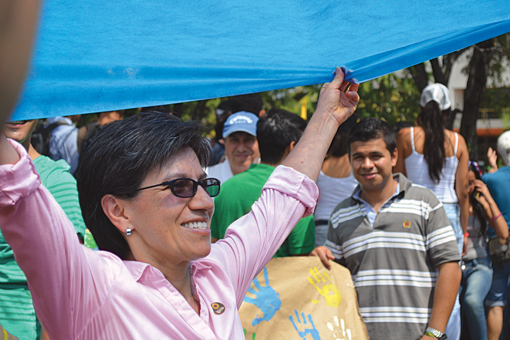Claudia López fled Colombia in October of 2013 after receiving death threats for her investigative reporting on the so-called parapolítica network that linked her country’s politicians with paramilitary groups. “Yesterday, I left the country as a preventative measure,” López wrote to her Twitter followers. “I will return when the police and the inspector general do their jobs.”
Two months later, López was not only back in Colombia; she was a successful candidate for the Colombian Senate. In March 2014, López won her seat representing the Alianza Verde (Green Alliance) with the slogan “Colombia se respeta” (“Colombia must be respected”). During the election, she received over 81,000 votes—making her the most-voted candidate in her party that election cycle. The small, progressive party won five out of 102 senate seats and came in sixth with 3.94 percent of the vote.
Defying what she considers the systemic corruption of her country—even at personal risk—is nothing new for the 44-year-old anti-corruption advocate. Since 2005, when she first published her findings about the expansion of Colombian paramilitary groups as a columnist in Semana.com, her work has led to the investigation of 126 members of Congress and the prosecution and conviction of 42 Colombian politicians for direct ties to paramilitary groups (one of the sentences was later revoked).
The Bogotá native has been committed to politics since her days at the Universidad Distrital, where she was part of the student movement La Séptima Papeleta (The Seventh Ballot), which called for a constitutional assembly during the 1990 congressional elections. She later transferred to the Universidad Externado de Colombia, where she studied government and international relations.
Her first professional opportunity in politics came while she worked in the Dirección de Participación Ciudadana (Office of Citizen Participation) as an assistant for Enrique Peñalosa’s 1995 campaign for mayor of Bogotá. In the following years, López directed the Departamento Administrativo de Acción Comunal (Community Action Administrative Department) for Bogotá’s mayor’s office, did consulting work, and later launched a career as a political columnist for publications including Semana.com, La Silla Vacía and El Tiempo.
In 2008, López joined Corporación Nuevo Arco Iris (New Rainbow Corporation), a Colombian NGO that works to promote democracy and national reconciliation, as coordinator of the organization’s Observatorio del Conflicto Armado (Armed Conflict Observatory). The threats came after an article she wrote for La Silla Vacía in 2011 helped lead to the investigation and imprisonment of the former governor of La Guajira department, Juan Francisco “Kiko” Gómez, in 2013 for his ties to narcotrafficker Marcos “Marquitos” de Jesús Figueroa García.
Today, even as her security is monitored by Colombia’s Unidad Nacional de Protección (National Protection Unit), López remains a relentless crusader for justice. “I felt a great sense of frustration,” López says, explaining why she embarked on a career that has blended journalism, advocacy and politics. “Democracy [in Colombia] no longer belonged to decent citizens; it had been taken over by the mafia and illegal armed actors.”
In addition to her anti-corruption platform, López has emphasized the need to construct a more equitable and accessible educational system and reform Colombia’s justice system. López’s platform also calls for better regulation of mining by the Colombian government, more responsible mining practices and the expansion of popular consultation.
“To achieve a more equal country, we have to practice active citizenship and politics,” López says. “The key is to defeat corruption with clean citizen-led politics.”
That message resonates in a country where widespread corruption and over 50 years of armed conflict have left many politically apathetic. Some 56 percent of voters abstained from the 2014 congressional elections.
According to López, the threat to Colombia extends beyond the conflict with guerrilla groups such as the Fuerzas Armadas Revolucionarias de Colombia (Revolutionary Armed Forces of Colombia—FARC) to the widespread corruption that has prevented the country from building better institutions. Even her supporters will concede that López, who takes her senate seat in July, will have her work cut out for her.




